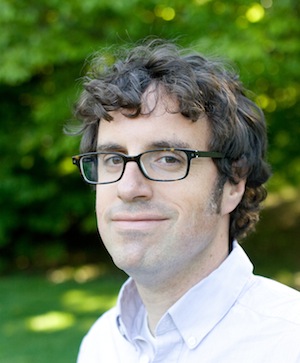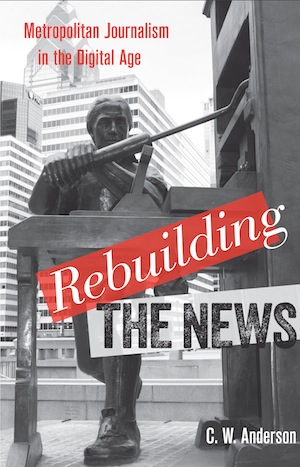 It’s Episode 5 of Press Publish, the Nieman Lab podcast! My guest this week is Chris Anderson, author of the new book Rebuilding the News: Metropolitan Journalism in the Digital Age.
It’s Episode 5 of Press Publish, the Nieman Lab podcast! My guest this week is Chris Anderson, author of the new book Rebuilding the News: Metropolitan Journalism in the Digital Age.
Chris — you’ll know his byline as C.W. Anderson, since contemporary American journalism and technology is silly with Chris Andersons — has written a book that looks at how the Philadelphia media market was affected by (and responded to) the rise of online journalism. He spent months inside the city’s major newsrooms, at The Philadelphia Inquirer and Daily News, and among the bloggers, startups, and other new players introduced to the media ecosystem by the web’s lowering of barriers to publication.
How did reporters’ conceptions of themselves change with the new competition for their audiences’ attention? How did they differentiate what they did from what others did — and who was willing to steal a few tricks from the bloggers? How did journalists take advantage (or not) of new opportunities to collaborate?
 Chris and I had a good, vigorous discussion about how his thinking about traditional media institutions evolved during his research, about how Internet-native approaches to news had trouble penetrating the Inquirer building, and whether or not “post-industrial” really describes the phase journalism’s going through. (He also outs himself as a confirmed Weberian.)
Chris and I had a good, vigorous discussion about how his thinking about traditional media institutions evolved during his research, about how Internet-native approaches to news had trouble penetrating the Inquirer building, and whether or not “post-industrial” really describes the phase journalism’s going through. (He also outs himself as a confirmed Weberian.)
Aside from this book and his other writing at Nieman Lab and elsewhere, Chris has been part of two of the most important state-of-the-news reports of recent years: 2009’s Downie-Schudson report (Chris was a research assistant on it) and 2012’s “Post-Industrial Journalism,” coauthored with Emily Bell and Clay Shirky. By day, he’s an assistant professor of media culture at CUNY’s College of Staten Island, a visiting fellow at Yale’s Information Society Project, and a Knight Media Policy Fellow at the New America Foundation.
This was a fun one — give it a listen.
Or listen in your browser:
[audio:http://traffic.libsyn.com/niemanlab/PressPublish005.mp3]
 C.W. Anderson
C.W. Anderson
Rebuilding the News: Metropolitan Journalism in the Digital Age
Community organizing — Wikipedia, the free encyclopedia
Chris’s articles for Nieman Lab
Alternative media — Wikipedia, the free encyclopedia
Objectivity (journalism) — Wikipedia, the free encyclopedia
“The Curious Case of Benjamin Button”
Ethnography — Wikipedia, the free encyclopedia
Haddon Township, New Jersey, “where community thrives”
The Wired City, Dan Kennedy’s upcoming book on local journalism in New Haven, Conn.
Herbert J. Gans, author of the classic ’70s news ethnography Deciding What’s News
Alex Jones’ “iron core of journalism”
Nieman Lab gloss on “Post-Industrial Journalism”
Mass media — Wikipedia, the free encyclopedia
Publics — Wikipedia, the free encyclopedia
My talk at Harvard Law in 2010 on journalists’ conception of aggregation
Philly.com, the joint site of The Philadelphia Inquirer and Daily News
NetNewsCheck, Dec. 10: “Inquirer, Daily
News to split from Philly.com”
“Tuesday Q&A: Bill Marimow on his new old job, and the future of the Philadelphia Inquirer”
Charlie Beckett on networked journalism
PBS MediaShift’s Collaboration Central
Jeff Jarvis, 2007: “Cover what you do best. Link to the rest.”
Photo by Jessica Kaufman.